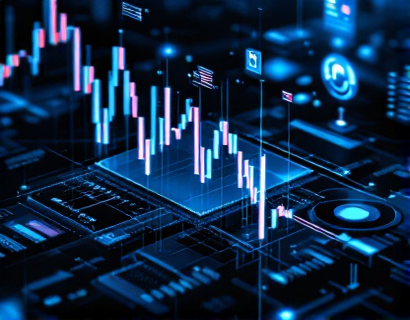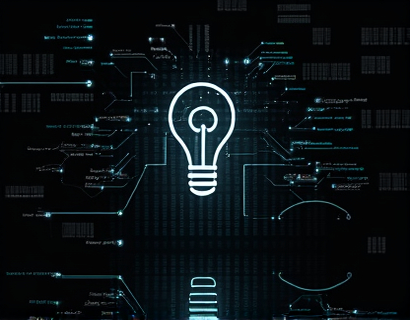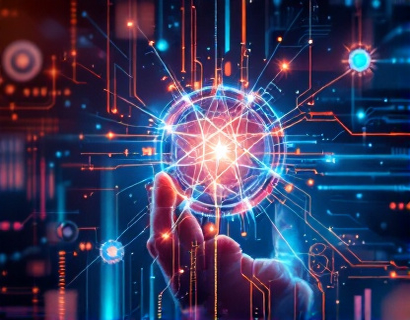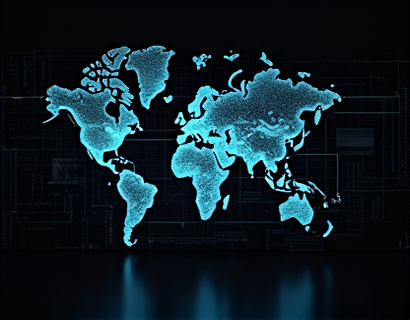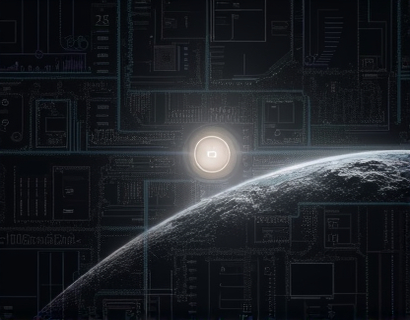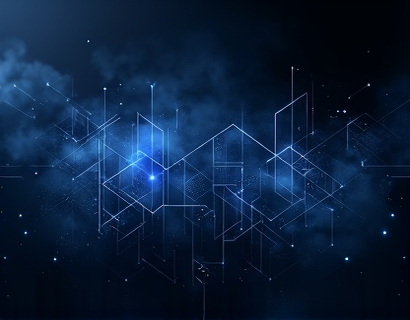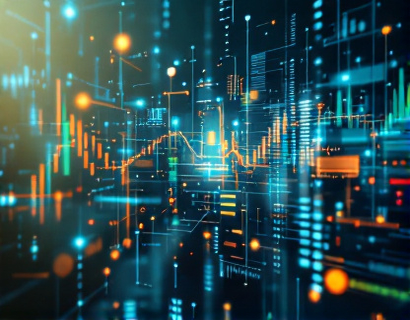Crypto AI: Revolutionizing Ucosystem App Engagement Through Advanced Tech Integration
The integration of blockchain and artificial intelligence (AI) is ushering in a new era of digital engagement, particularly within the realm of Ucosystem apps and services. This transformative combination leverages the decentralized and secure nature of blockchain technology with the intelligent and adaptive capabilities of AI, creating a powerful synergy that enhances user experience and drives innovation. This article delves into the profound impact of this integration, offering valuable insights for tech enthusiasts and professionals who are navigating the future of digital solutions.
The Ucosystem, a term used to describe the interconnected network of apps and services built on blockchain technology, has seen significant advancements through the incorporation of AI. These advancements are not just incremental improvements but revolutionary changes that are redefining how users interact with digital platforms. The synergy between blockchain and AI is creating more secure, efficient, and personalized experiences, which are crucial for the growth and adoption of Ucosystem applications.
Enhanced Security Through Blockchain
One of the primary benefits of integrating blockchain into Ucosystem apps is the enhanced security it provides. Blockchain's decentralized ledger technology ensures that data is stored across multiple nodes, making it extremely difficult for malicious actors to alter or manipulate information. This inherent security feature is particularly important for apps that handle sensitive user data, such as financial transactions, personal identification, and health records.
Traditional centralized systems rely on a single point of failure, which can be a significant vulnerability. In contrast, blockchain's distributed nature means that even if one node is compromised, the overall system remains intact. This robust security framework builds trust among users, encouraging them to engage more freely and confidently with Ucosystem apps.
AI-Driven Personalization
AI plays a pivotal role in personalizing the user experience within Ucosystem apps. By analyzing vast amounts of data, AI algorithms can identify patterns and preferences, allowing for highly tailored interactions. For instance, a financial Ucosystem app can use AI to analyze a user's spending habits and provide personalized budgeting tips or investment recommendations.
Personalization extends beyond just recommendations. AI can also optimize app functionalities based on user behavior, ensuring that the most relevant features are easily accessible. This not only improves user satisfaction but also increases engagement and retention rates. In a competitive market, the ability to offer a personalized experience can be a significant differentiator for Ucosystem apps.
Smart Contracts and Automated Processes
Smart contracts, a key feature of blockchain technology, are revolutionizing the way processes are handled within Ucosystem apps. These self-executing contracts with the terms directly written into code eliminate the need for intermediaries, reducing costs and increasing efficiency. For example, in a supply chain management app, smart contracts can automate payments once certain conditions are met, such as the delivery of goods.
The automation provided by smart contracts reduces human error and speeds up transaction times. This is particularly beneficial for apps that require real-time processing, such as trading platforms or peer-to-peer marketplaces. The seamless and trustless execution of smart contracts enhances the overall reliability and performance of Ucosystem applications.
Predictive Analytics and Decision Making
AI's capability to perform predictive analytics is another game-changer for Ucosystem apps. By analyzing historical data and current trends, AI can forecast future events and behaviors, enabling apps to make informed decisions. For instance, a healthcare Ucosystem app can use predictive analytics to identify potential health risks based on a user's medical history and lifestyle data, allowing for proactive health management.
In the financial sector, predictive analytics can help detect fraudulent activities by identifying unusual patterns in transaction data. This not only protects users but also helps financial institutions comply with regulatory requirements. The integration of AI-driven predictive analytics empowers Ucosystem apps to offer more sophisticated and reliable services, further enhancing user trust and engagement.
Decentralized Identity Management
Identity management is a critical aspect of Ucosystem apps, and blockchain technology offers a decentralized solution to this challenge. Traditional identity systems are often centralized and vulnerable to breaches, but blockchain-based identity management provides a more secure and user-controlled approach. Users can manage their digital identities on the blockchain, granting or revoking access to different apps as needed.
This decentralized identity management system ensures that user data is not stored in a single location, reducing the risk of large-scale data breaches. Additionally, users have greater control over their personal information, which can increase their willingness to engage with Ucosystem apps. The combination of blockchain and AI in identity management not only enhances security but also provides a seamless and user-friendly experience.
Enhanced User Interfaces Through AI
AI is also transforming the user interfaces of Ucosystem apps, making them more intuitive and user-friendly. Natural Language Processing (NLP) and machine learning algorithms can power chatbots and virtual assistants, providing users with instant and accurate assistance. These AI-driven interfaces can understand and respond to user queries in a natural and conversational manner, reducing the learning curve and improving user satisfaction.
Moreover, AI can analyze user interactions to continuously improve the user interface. By identifying which features are most used and which areas need improvement, AI can suggest design changes that enhance usability. This data-driven approach to UI/UX design ensures that Ucosystem apps remain relevant and user-centric, fostering long-term engagement.
Fraud Detection and Prevention
Fraud is a persistent issue in digital platforms, and the integration of AI in Ucosystem apps significantly enhances fraud detection and prevention capabilities. AI algorithms can analyze transaction patterns and user behavior in real-time, identifying anomalies that may indicate fraudulent activity. This proactive approach allows apps to take immediate action, such as flagging suspicious transactions or temporarily suspending accounts, to mitigate risks.
The accuracy and speed of AI-driven fraud detection are far superior to traditional methods, which often rely on rule-based systems that can be easily bypassed. By integrating AI, Ucosystem apps can provide a safer environment for users, which is essential for building and maintaining trust. This, in turn, leads to higher user retention and increased adoption of the platform.
Scalability and Efficiency
The combination of blockchain and AI not only enhances specific features but also improves the overall scalability and efficiency of Ucosystem apps. Blockchain's distributed ledger reduces the load on central servers, as data is processed and stored across multiple nodes. This distributed architecture allows for better scalability, enabling apps to handle a growing number of users and transactions without performance degradation.
AI further optimizes efficiency by automating routine tasks and optimizing resource allocation. For example, AI can manage server loads by dynamically adjusting computing resources based on real-time demand. This ensures that the app remains responsive and reliable, even during peak usage periods. The synergy between blockchain and AI creates a robust and scalable infrastructure that can support the evolving needs of Ucosystem applications.
Challenges and Considerations
While the integration of blockchain and AI offers numerous benefits, it also presents several challenges that need to be addressed. One of the primary concerns is the computational complexity and energy consumption associated with blockchain, particularly proof-of-work consensus mechanisms. However, the adoption of more efficient consensus algorithms, such as proof-of-stake, can mitigate these issues.
Another challenge is the regulatory landscape, which is still evolving in the realm of blockchain and AI. Compliance with data protection laws, such as GDPR, is crucial, and apps must ensure that user data is handled transparently and ethically. Additionally, the technical expertise required to develop and maintain these advanced systems can be a barrier for some developers and organizations.
Despite these challenges, the potential benefits of integrating blockchain and AI in Ucosystem apps are substantial. By addressing these issues proactively, the tech community can harness the full potential of this powerful combination, driving innovation and enhancing digital engagement.
Future Prospects
The future of Ucosystem apps is bright, with the integration of blockchain and AI set to unlock new possibilities. As technology continues to evolve, we can expect even more sophisticated applications of these technologies. For instance, the development of interoperable blockchain networks will enable seamless interactions between different Ucosystem apps, creating a more interconnected and cohesive digital ecosystem.
Furthermore, the advancement of AI, particularly in areas like edge computing and quantum machine learning, will further enhance the capabilities of Ucosystem apps. Edge computing can reduce latency and improve real-time processing, while quantum machine learning can solve complex problems that are currently infeasible with traditional AI methods.
In conclusion, the integration of blockchain and AI is revolutionizing the Ucosystem, offering enhanced security, personalized experiences, automated processes, and more. As tech enthusiasts and professionals, understanding and embracing these advancements is crucial for navigating the future of digital solutions. The potential for innovation and growth is immense, and those who leverage these technologies will be at the forefront of the next digital revolution.













